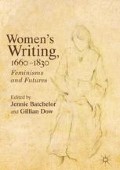Abstract
So writes the Italian novelist Elena Ferrante—the pseudonymous author of the critically acclaimed ‘Neapolitan’ series—about Jane Austen’s anonymity. In singling out Austen’s ‘choice’ to remain ‘a Lady’ on publication, Ferrante deals anachronistically with the literary marketplace in England in the opening decades of the nineteenth century. As Jennie Batchelor explores in this collection, the question of anonymity and pseudonymity is a vexed and complex one for women throughout our period: book historians in recent decades have demonstrated that anonymity was standard when Austen herself was publishing. Ferrante’s article serves rather as a passionate assertion of her own right to anonymity in the twenty-first century, and as an introduction to her own love of Austen. Even while Ferrante defends a woman writer’s right to remain unknown, her knowledge of and interest in the writer’s life intrudes when she writes of Austen’s ‘lady narrator’. In Ferrante’s words, ‘the disorderly world of the everyday—interrupts her, forcing her to hide the pages’. No matter how fully Ferrante seems to have rejected the biographical impulse in her reading of Sense and Sensibility (1811)—and her article takes in a broad sweep of classical European fiction with specific examples from Goethe and Tolstoy—with this reference, we return to the biographical commonplaces. We are back at the Austens’ home in Chawton, back to the creaking door interrupting the creative genius’ pen. We cannot un-know what we know (or what we think we know) about the woman behind the writing. Many readers, if not Ferrante herself, would not wish to: as Terry Castle wrote 20 years ago, in her infamous review of Austen’s letters edited by Deirdre Le Faye, readers of Austen’s fiction are ‘hungry for a sense of the author’s inner life’.1 And these readers still include the most hardened and dedicated of literary theorists.
Access this chapter
Tax calculation will be finalised at checkout
Purchases are for personal use only
Author information
Authors and Affiliations
Editor information
Editors and Affiliations
Copyright information
© 2016 The Author(s)
About this chapter
Cite this chapter
Dow, G. (2016). The ‘Biographical Impulse’ and Pan-European Women’s Writing. In: Batchelor, J., Dow, G. (eds) Women's Writing, 1660-1830. Palgrave Macmillan, London. https://doi.org/10.1057/978-1-137-54382-0_12
Download citation
DOI: https://doi.org/10.1057/978-1-137-54382-0_12
Published:
Publisher Name: Palgrave Macmillan, London
Print ISBN: 978-1-137-54381-3
Online ISBN: 978-1-137-54382-0
eBook Packages: Religion and PhilosophyPhilosophy and Religion (R0)

